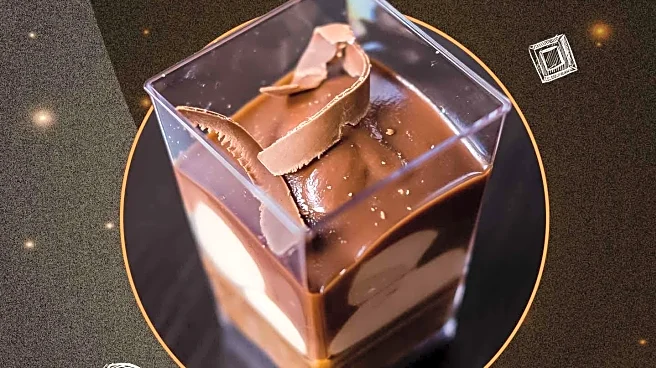What's Happening?
Dubai chocolate-inspired desserts are gaining popularity at state fairs across the United States. Confectioner Stephen El Gidi will showcase his Dubai chocolate cheesecake at the State Fair of Texas, featuring Belgian chocolate and pistachio spread. This trend, inspired by the original Dubai Chocolate bar created by Sarah Hamouda in 2021, has spread to various fairs, including the Minnesota State Fair and the Orange County Fair. The desserts replicate the flavor profile of Dubai chocolate, offering a more affordable version of the luxury treat. The trend highlights a shift from traditional fair foods to more gourmet offerings.
Why It's Important?
The introduction of Dubai chocolate desserts at state fairs signifies a growing interest in gourmet and international flavors among American consumers. This trend could influence the confectionery industry by encouraging the development of more exotic and luxurious dessert options. It also reflects a broader cultural exchange, bringing Middle Eastern culinary influences to mainstream American events. However, there are concerns about cultural appropriation, as the trend may overlook the cultural significance of the original Dubai chocolate. The popularity of these desserts could lead to increased demand for similar products in grocery stores and restaurants.
What's Next?
As Dubai chocolate desserts continue to gain traction, more state fairs and food vendors may adopt similar offerings, potentially expanding the trend nationwide. Confectioners might explore new flavor combinations and presentations to capitalize on consumer interest. Additionally, discussions around cultural appropriation and authenticity may arise, prompting a reevaluation of how international culinary trends are marketed and consumed in the U.S. The trend could also inspire collaborations between American and Middle Eastern confectioners, fostering innovation in the dessert industry.
Beyond the Headlines
The Dubai chocolate trend at state fairs raises questions about the balance between cultural appreciation and appropriation. While it introduces American audiences to Middle Eastern flavors, it risks commodifying cultural elements without proper acknowledgment. This development could spark conversations about ethical marketing practices and the importance of respecting cultural origins in the culinary world. Furthermore, the trend highlights the evolving nature of state fairs, which are increasingly incorporating diverse and gourmet food options to attract a broader audience.










